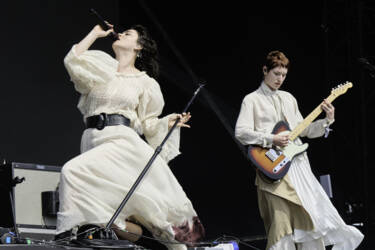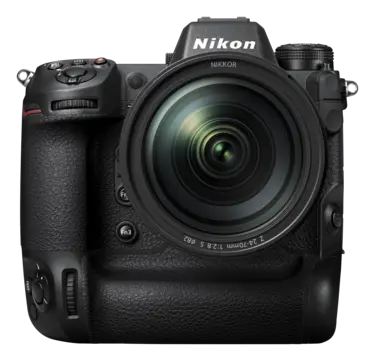Take better images at festivals and gigs

Nikon Ambassador and music photographer to the stars Scarlet Page tells you how to take better pictures at festivals and tries out the new NIKKOR Z 28-400mm f/4-8 VR superzoom
Nikon Ambassador Scarlet Page has been taking photographs of musicians, on and off stage, for three decades. From touring with The Rolling Stones and the Red Hot Chili Peppers to her celebrated portraits of the likes of Dave Grohl, Paul McCartney and Amy Winehouse, Scarlet is one of the most in-demand photographers in the music business.
This year (as ever) Scarlet was at Glastonbury, so we sent her the new NIKKOR Z 28-400mm f/4-8 VR to try out, and spoke to her about the results, the art of music photography and her advice for anyone taking a camera to a gig on how to get the best images.

Scarlet Page

Scarlet Page with her NIKKOR Z 28-400mm f/4-8 VR
What was it when you were young that made you pick up a camera?
After school I went to college to do an art foundation course, and my art was actually very ‘photographic’. I wasn’t very free flowing. I did things like black and white paintings that were more like photographs. And when we did photography as part of the course, I got that excitement of having a camera, learning how to use it and then developing and printing. I did a degree in photography and started assisting someone. At that time, I didn’t really want to be a music photographer. I was just enjoying my photography ride. Then I started assisting someone in music photography and began to take my own pictures in the pit at the front of the stage. I had my first photographs published about 30 years ago and it’s been an interesting journey since then.
You started with film. How was the transition to digital for you?
I was a bit reluctant. But my first digital camera was a Nikon D2X and there are images I go back to now taken with that camera, like black and white portraits of Amy Winehouse, that stand up really, really well. The big change for me was that clients wanted everything faster, because digital is faster, and therefore you have to become more than a photographer – you have to be a retoucher, editor, social media manager… but I love learning and doing new things.

Z 8 + NIKKOR Z 28-400mm f/4-8 VR, 200mm, 1/640 sec, f/8, ISO 400 ©Scarlet Page
Moving around at a big festival like Glastonbury, you must have to travel pretty light. What’s in the bag?
I have two bodies, a Z 8 and Z 9, and my go-to lenses are the NIKKOR Z 24-70mm f/2.8 S and the NIKKOR Z 70-200mm f/2.8 VR S, one on each body so I don’t have to worry about changing lenses. I also have the NIKKOR Z 14-24mm f/2.8 S that I put on for Coldplay this year as there’s a ramp out on the front of the stage for Chris Martin to come out on and the wide angle is good for that. Also, it’s the Pyramid Stage, so that’s a visual in itself, plus there’s going to be confetti and fireworks and you want to be able to capture the magnitude of what’s happening on stage. The other thing I always have is something to stand on.

Scarlet Page with her NIKKOR Z 28-400mm f/4-8 VR
What about the new NIKKOR Z 28-400mm f/4-8 VR? How did that work for you?
It’s a great lens, really sharp. I used it for the first time at the London Stadium a few days before Glastonbury where the Foo Fighters were playing. I used it for the support acts, and I loved the fact that it goes up to 400mm. It’s really light, easy to throw, it’s got so much capacity, but it’s small. I used it so much, really put it through its paces. For someone coming to a festival who wants to take some great shots you wouldn’t need anything else. One body and that lens and 100% it would see you through the weekend. Quite a few photographers came up to me and were like, “Oh, I need to give that a go!” It’s got me thinking that I really need the extra reach of a 400mm in my bag!


How do your portrait sessions differ to gig photography?
With portraits you’re often trying to do quite a lot in a short space of time, and I like to create a moment that looks ‘real’. With gigs, it’s sometimes not important to know the artist’s work, and actually I like to be surprised by the energy of someone I’ve never photographed before. With portraits, though, I think it’s good to be more familiar with their work. I’m trying to capture their soul a little bit more, what they’re about. I need to capture them at ease, but still looking cool. It’s quite a brief!
What are you looking for in a great image?
Generally, you only get three songs in the photographers’ pit and it can get quite crowded. For Coldplay at Glastonbury, there were only six photographers, but at other gigs there can be 30. You get a spot and stay there and then it’s down to luck. You’re definitely looking for eye contact, if you can get it, or the artist facing you. I’m always looking for something of visual interest, whether that’s movement or colour.

Z 8 + NIKKOR Z 28-400mm f/4-8 VR, 140mm, 1/320 sec, f/7, ISO 640 ©Scarlet Page
How many images do you take at a gig?
Too many! I just edited the Foo Fighters and that was down from around 3,000 images taken over a three-hour period. At Glastonbury, for the artists where I had three songs, that would be about 400 each time. Sometimes I overshoot when there’s a ‘moment’, but that archive has become pretty important to me. I would rather keep more images so that in time I can go back and look again. Things that might not be picked up straight away can become more interesting years later. I’m a bit scared to throw things away!
What advice would you have for someone who wanted to get into your industry?
You have to have a lot of determination and you have to make things happen for yourself. You have to prove your passion, prove your quality, be nice to people, be quick to get back to people. You have to work on personal projects so that you’ve always got things to show. The thing about photography is that you’re always learning. I did a talk recently to fashion photography students and the quality was insane! I thought, I need to pull my socks up! And I love that, the inspiration you get from others to try new things. You have to set yourself tasks and you can’t be lazy. From the outside, people think it's a great job – and it is – but it’s hard work. You can’t have days off, you spend a lot of money on kit and you have to keep up to date. But to take something that you love and turn it into something that you can use to make a living is incredible.

Z 9 + NIKKOR Z 14-24mm f/2.8 S, 18mm, 1/250 sec, f/2.8, ISO 1600 ©Scarlet Page
Scarlet’s top tips for gig photography
- If you’re far back from the stage, go for atmosphere. Wait for things like big lights coming on and capture those spilling across the crowd. Don’t bother trying to focus in on a singer from far back. You’re much better creating something from the scale of the show.
- Use the viewfinder if you can. I see lots of people holding cameras up and checking via the monitor, and that’s fine, but I always find personally that using the viewfinder gets me better results.
- Get yourself in the right place. I met a wedding photographer who’s a big Foo Fighters fan and she just brings a little point and shoot, but she queues up to get to the stage barricade and she gets amazing results. They’re incredible!
- Get familiar with the show. If you’re following a band or artist and go to different shows on the same tour, you can know when the moments are coming – when the lights are going to change, or when fireworks are going to be let off, or when the band interact in a certain way. Then you can plan a bit more for those shots.
- Get creative. If I’m on tour, I can start playing with different approaches after a while, doing double exposures or blurring, adding filters, just doing different things to see what happens.
- Get your settings right. I like a heavy camera and, combined with a long lens, I keep my shutter speed quite high. I’m usually at f/2.8 shooting live because the lights change a lot and I also want a little separation between the performer and the background. So I balance the shutter speed and the ISO for the aperture I’m using.
- Don’t be scared to push ISO. At a recent Zayn Malik gig I was at the light was really low and I was shooting at 20,000 ISO. It was a little scary but turned out great. New cameras can really handle that ISO being pushed when you need it.
- Look for movement. Some acts are amazing musically, but not so much visually. People who provide variety in their performance, through movement, or clothes or things like wind machines, all of these give you something to shoot. But if a singer is just standing behind the mic, you can’t get anything really exciting, because their face is blocked by the mic.
Keep up to date with Scarlet here.
Discover the NIKKOR Z 28-400mm f/4-8 VR
Featured products
More from our Nikon Family
How to photograph retro ’90s magazine action portraiture
How to shoot a live performance video

Unlock greater creativity






